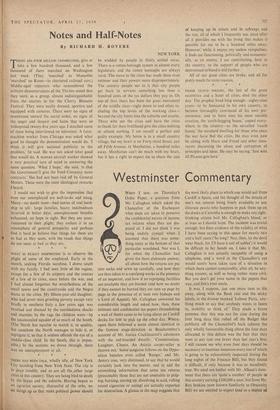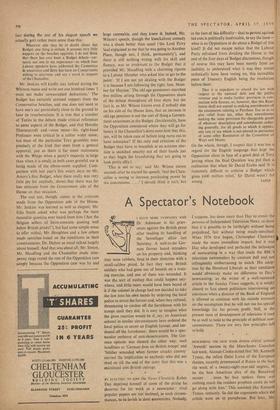Westminster Commentary
WHEN I saw, on Thursday's ' Order Paper, a question from Mr. Callaghan which asked the Chancellor of the Exchequer what steps are taken to preserve the confidential nature of income tax returns when they are dis- posed of, I did not think' I was being unduly cynical when I assumed that there was some- thing nasty at the bottom of that particular woodshed. Nor was I, for when the Chancellor had given the most elaborate answer, all about how the returns are put into sacks and sewn up carefully, and how they are then taken to a repulping works in the presence of an inspector, and how if no repulping facilities are-available they are burned (and how no doubt if they cannot be burned they are torn up page by page in the presence of at least two bishops and a Lord of Appeal), Mr. Callaghan unwound his considerable length and asked how, then, these intimate and confidential tax-papers (brandishing a wad of them) came to be lying about on Cardiff docks for him to pick up the other day. Where- upon there followed a scene almost identical to the famous stage-direction in Beachcomber's account of Mr. Justice Cocklecarrot's adventure with the red-bearded dwarfs : 'Consternation. Laughter. Cheers. An Asiatic carpet-seller is thrown out.' Some sanguine fellows on the Oppo- sition benches even called 'Resign,' and Mr. Amory rose, very distressed, to say that he would certainly look into the matter, and to add the astonishing information that some tax returns (presumably those that are not amenable to pulp- ing, burning, tearing up, dissolving in acid, rolling round cigarettes or eating) are actually exported for destruction. A glance at the map suggests that the most likely place to which one would sail from Cardiff is Spain, and the thought of the details of one's tax returns being freely available to any illiterate peseta who happens to pick them up on the docks at Caramba is enough to make any right- thinking citizen boil Mr. Callaghan's blood, or at least so 1 should hope. The incident was trivial enough; but finer evidence of the validity of what I have been saying in this space for nearly two and a half years (`So long? Nay, then, let the devil wear black, for I'll have a suit of sables') it would be difficult to lay hands on. I take it that Mr. Callaghan is not actually incapable of using a telephone, and a word in the Chancellor's ear would surely have taken care of a situation in which there cannot conceivably, after all, be any- thing sinister, as well as being rather more civil. But you don't get your name in the papers that way, and Jim's your uncle.
It was, I suppose, just one more item to file away, along with the Bank rate and the sticky labels, in the drawer marked 'Labour Party, any- thing much to say that anybody wants to listen to, inability to think of.' They made a brave pretence that this was not the case during the four long days that rolled off the Budget like publicity off the Chancellors back (almost the only wholly favourable thing about the four days allocated to this debate was the fact that they were at any rate one fewer than last year's five; I still cannot see why even four days should be necessary to examine Measures every one of which is going to be exhaustively inspected during the long nights of the Finance Bill), but they found it difficult, if only because it was' so manifestly true. We need not bother with Mr. Allaun's state ment that there are 'quite a number' of people in this country earning £100,000 a year, but from Mr. Roy Jenkins (now known familiarly as Obscenity Bill) we are entitled to expect (and as a matter of fact during the rest of his elegant speech we actually got) rather more sense than this: Whatever else may be in doubt about this Budget, one thing is certain. It arouses very little support on the benches opposite. I do not think that there has ever been a Budget debate—cer- tainly not one in my experience—in which four Labour speakers have addressed the Committee in succession and there has been no Conservative willing to intervene and say a word in support of the Chancellor.
Mr. Jenkins will kindly stay behind during the Whitsun recess and write out one hundred times 'I must not make unwarranted deductions.' The Budget has certainly aroused support from the Conservative benches, and one does not need to have one's ear particularly close to the ground to hear its reverberations. It is true that a number of Tories in the debate made critical references to some aspects of the Budget, and that Horatio Thorneycroft and—even more—his right-hand Professor were critical in a rather wider sense; but most of the particular. Tory grumbles were precisely of the kind that stem from a general approval, just as there is far more restiveness with the Whips when a party's majority is large than when it is small; in both cases grateful use is being made of the elbow-room supplied. Com- parison with last year's five weary days on Mr. Amory's first Budget, when there really was very little joy for anybody, shows that there was far less criticism from the Government side of the House on that occasion.
The real test, though, comes in the criticism made from the Opposition side of the House. Mr. Jenkins was learned as well as elegant; Mr. Ellis Smith asked what was perhaps the most recondite question ever heard from him (Are the Belgian sellers of ferro-concrete quoting well below British prices?'), but had some simple sense to offer withal; Mr. Houghton and a few others made speeches based on the conditions in their constituencies; Dr. Dalton as usual talked largely about himself. And that was about all; Mr. Simon, Mr. •Maudling and the Chancellor made nine- penny rings round the rest of the. Opposition case simply because the Opposition case was by and large untenable, and they knew it. Indeed, Mr. Wilson's speech, though the knockabout comedy was a shade better than usual (`the Lord Privy Seal explained to me that he was going to Another Place, though not, I think, permanently'), and there is still nothing wrong with his skill and fluency, was so irrelevant to the Budget that it provided Mr. Maudling with a charming riposte to a Labour Member who asked him to get to the point : 'If I am not yet dealing with the Budget it is because 1 am following the right. hon. Mem- ber for Huyton.' The old age pensioners marched five million strong through the Opposition share of the debate throughout all four days; but the fact is, as Mr. Wilson knows even if nobody else on his side of the House does, that an increase in old age pensions is not the sort of thing a Govern- ment announces in the Budget. (Incidentally, have the Opposition considered where they will go for honey if the Chancellor's demi-semi-hint that this, too, will be taken care of before long turns out to have substance? If the only real criticism of the' Budget they have to brandish at an autumn elec- tion is snatched smartly out of their hands just as they begin the brandishing they are going to look pretty silly.) 'This is not to say,' said Mr. Wilson eleven seconds after he started his speech, 'that the Chan- cellor is wrong to increase purchasing power by tax concessions. . . .1 I should think it isn't; but in the face of this difficulty—that to protest against tax cuts is politically inadvisable, to say the least— what is an Opposition to do about a Budget of this kind? It did not escape notice that the Labour Party refrained from dividing the House at the end of the four days of Budget discussions, though of course this may have been merely from an inability to understand what it was they would technically have been voting on, this incredible piece of Treasury English being the resolution before them ;
That it is expedient to amend the law with respect to the national debt and the public revenue and to make further provision in con- nection with finance, so, however, that this Reso- lution shall not extend to making amendments of the enactments relating to Purchase Tax so as to give relief from tax, other than amendments making the same provision for chargeable goods of whatever description and amendments reduc- ing generally, for all goods to which it applies, any rate of tax which is not altered in pursuance of some other Resolution of the Committee of Ways and Means.
On the whole, though, 1 suspect that it was less a regard for the English language that kept the Opposition silent in face of a •good deal of Tory jeering when the final Question was put than a realisation that when Sir David Eccles said 'It is extremely difficult to criticise a Budget which gives £400 million relief,' Sir David wasn't far



































 Previous page
Previous page